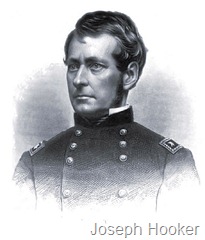May 1, 1862. At Pittsburgh Landing, Tennessee, a general order was issued transferring Major – General Thomas’s division from the Army of the Ohio to the Army of Tennessee, and Major-General Thomas to the command of the army formerly under General Grant, of which the divisions of Generals McClernand and Wallace were to constitute a reserve, under General McClernand. Major-General Grant retained command of his district, including the army corps of Tennessee, but acted as second in command under the Major General Commanding the Department.
—The rebel schooner Sarah, while endeavoring to run the blockade of Bull’s Bay, South-Carolina, was chased ashore by a party of the crew of the United States vessel Onward, under the command of Acting Master Sleeper. The rebel crew escaped after setting fire to the schooner.
—At Corinth, Mississippi, four hundred Germans from a Louisiana regiment, who had been sent out from the rebel camp on outpost duty, came into the National lines in a body with white flags on their guns, and gave themselves up as deserters.
—The United States steamer Mercedita, Commander Stellwagen, on the twenty-seventh of April, about fifteen miles north of Hole in the Wall, captured the steamer Bermuda, laden with articles contraband of war, among which were forty-two thousand pounds of powder, seven field-carriages, and a number of cannon, swords, pistols, shells, fuses, cartridges, military stores, saltpetre, saddles, ingots of tin, etc. She was taken into Philadelphia for adjudication.
—This evening, the rebel Colonel Morgan, with his squadron, attacked the train of Gen. Mitchel, near Pulaski, Giles County, Tenn., and captured sixty wagons and about two hundred and seventy unarmed National troops. Morgan not having the means of moving the prisoners, released them on parole.—Shelbyville (Tenn.) News, May 8.
—Yesterday General O. M. Mitchel occupied Huntsville, Alabama, after a lively engagement with seven thousand of the rebel infantry and cavalry.—National Intelligencer, May 3.
—Intelligence was received of a battle at Poralto, Texas, on the fifteenth of April, between the National forces, under General Canby, and a party of Texans who had fortified themselves at that place. The rebels were defeated. General Canby’s loss was twenty-five killed and wounded.—Missouri Republican, May 2.
—General Robert Anderson and Sergeant Peter Hart, received medals from the New-York Chamber of Commerce, in honor of the heroic defence of Fort Sumter.
—The following instructions were sent to the flag-officer of each of the blockading squadrons from the Navy Department at Washington:
Sir: The approach of the hot and sickly season upon the Southern coast of the United States renders it imperative that every precaution should be used by the officers commanding vessels to continue the excellent sanitary condition of their crews. The large number of persons known as “contrabands” flocking to the protection of the United States flag, affords an opportunity to provide in every department of a ship, especially for boats’ crews, acclimated labor. The flag-officers are required to obtain the services of these persons for the country, by enlisting them freely in the navy, with their consent, rating them as boys, at eight dollars, nine dollars, and ten dollars per month, and one ration. Let a monthly return be made of the number of this class of persons employed on each vessel under your command.
—Brigadier-general William T. Sherman was confirmed by the United States Senate as Major-General of volunteers.[1]
—General Butler began the debarkation of the troops of his command at New-Orleans, and by proclamation declared the object and purposes of the United States in taking possession of that city “to restore order, maintain public tranquillity, and enforce peace and quiet.”—(Doc. 1.)
—Last Sunday afternoon, April twenty-seventh, a skirmish took place near Horton’s Mills, ten miles from Newbern, N. C, on the Pollockville road, between a party of cavalry belonging to the One Hundred and Third New-York regiment and a body of rebel cavalry, resulting in the defeat and dispersion of the rebels, with a loss of three killed and ten prisoners. The Union casualties were private Sanders, company C, killed, and three officers, and the same number of privates wounded.—Newbern Progress.
—Yesterday the Union siege-batteries opened their fire against the rebel works at Yorktown, Va.—N. Y. Herald, May 8.
—A Fight took place at Clark’s Hollow, Va., between company C, of the Twenty-third Ohio infantry, under the command of Captain J. W. Stiles, and a party of rebel bushwhackers belonging to the band of the notorious Capt Foley, resulting in the defeat of the latter.—(Doc. 3.)
[1] General Halleck, in a despatch to the Secretary of War, urged the promotion of General William T. Sherman, on account of his Important services at the battle of Shiloh, as follows:
“It is the unanimous opinion here, that Brig.-Gen. W. T. Sherman saved the fortunes of the day on the sixth, and contributed largely to the glorious victory of the seventh. He was in the thickest of the fight on both days, having three horses killed under him and being wounded twice. I respectfully request that he be made a Major-General of volunteers, to date from the sixth instant.”



